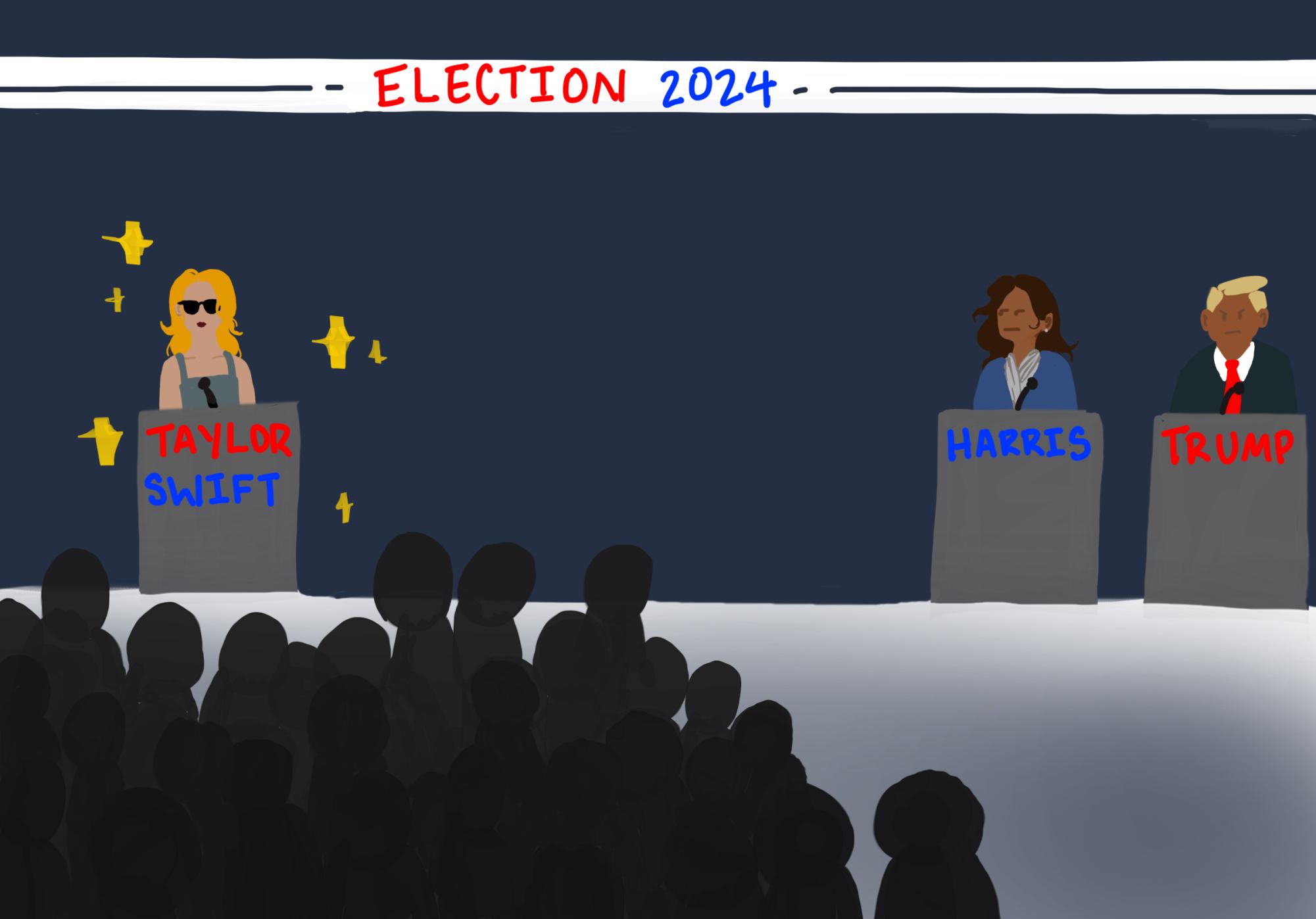
Moments after the Sept. 10 presidential debate between Kamala Harris and Donald Trump, Taylor Swift posted on her @taylorswift Instagram with an official endorsement for Harris, weighing in on a tumultuous election season.
Why does it make news when celebrities and influencers share political opinions, quietly or loudly advocating for one side or another? The seemingly sudden intersection of social media platforms and political parties highlights how celebrities and influencers can impact politics.
The rise of social media plays a role in widening the influence of media personalities, especially if they take a side on a divisive issue. The Center for Information and Research on Civic Learning and Engagement found in a 2020 poll that around 70% of young adults interacted with and learned information about that year’s general election through social media.
According to the Pew Research Center, from 2020-23, the percentage of U.S. adults who get their news from TikTok rose more than fourfold; a third of adults under age 30 now get their news through TikTok.
Aside from the growing dependency on media platforms as news outlets, researchers Chao Ding, Wael Jabr and Hong Guo discussed in a 2023 study how traditional media outlets promote increasingly more extreme views, leaving moderates or independents to gravitate towards more approachable influencers who accommodate a wider audience.
Influencers have power, and their posts leave an impression or—as their name expresses— influence the people who watch them. This power can have positive outcomes: introducing people to the political scene, persuading individuals to vote, and educating or discussing current topics that larger political parties usually can’t take a stance on.
With the limitless potential of social media, more people can access and interact with politics in a less intimidating fashion.
Trump and Harris realized this opportunity and started initiatives such as Harris’ “Creators for Kamala” or Trump’s regular posts at Truth Social. They leveraged the power of celebrity by extending invitations to stars for both the Republican National Convention and Democratic National Convention, urging more than ever that influencers cover the event on their platforms.
Creators can easily mislead people, proliferate misinformation, spread inflammatory content and unnecessarily escalate situations, especially if a creator has a purposeful narrative in mind or is a viewer’s only source of information.
The larger the platform of a content creator, the greater responsibility they have to present their information and opinions without causing harm.
Public figures outside politics who suddenly unveil how they’re voting when election season rolls around can appear disingenuous or self interested: seeking to capitalize on the occasion. Sharing political views spontaneously in this manner can change how audiences perceive the character and credibility of a celebrity.
Using celebrity in this way feels different from leveraging a substantial platform to talk about issues or bring attention and donations to a cause, even if they are less knowledgeable about the topic.
There is a significant difference between expressing political opinions and spreading awareness about global issues.
The disbelief that comments from an influencer or celebrity can have any effect on their audience’s personal opinions at all is common. While this may be true for a few individuals who are firmly rooted in their views, hearing and learning about different perspectives and circumstances from anyone in general, let alone a creator, will have an impact, big or small, on most audiences.
Content creators often build their brand on the fact that others look up to and are inspired by them, with some audiences even going as far as becoming parasocial and believing they know a famous individual personally. In that sense, an influencer’s political opinion could have an even greater impact.
In lieu of increasing political knowledge through the entertainment industry, it is essential to remember the role of journalists and credible news sources. While content creators may pull data and news from these journalistic sources, their own biases can twist how events are portrayed.
While the reach of celebrities engage new populations in politics, they cannot replace the role of reporters, for whom credibility is not optional.
Instead of getting caught up in the Taylor Swift endorsement, read reputable sources, know the issues, and (if you are eligible) cast an informed, not entertained, ballot.